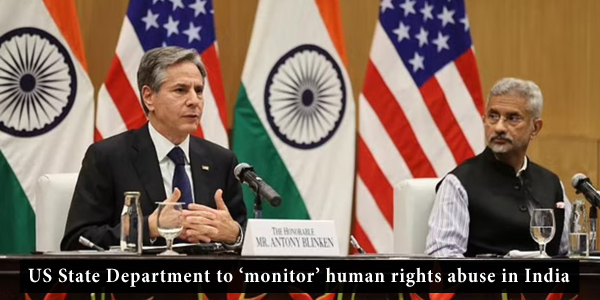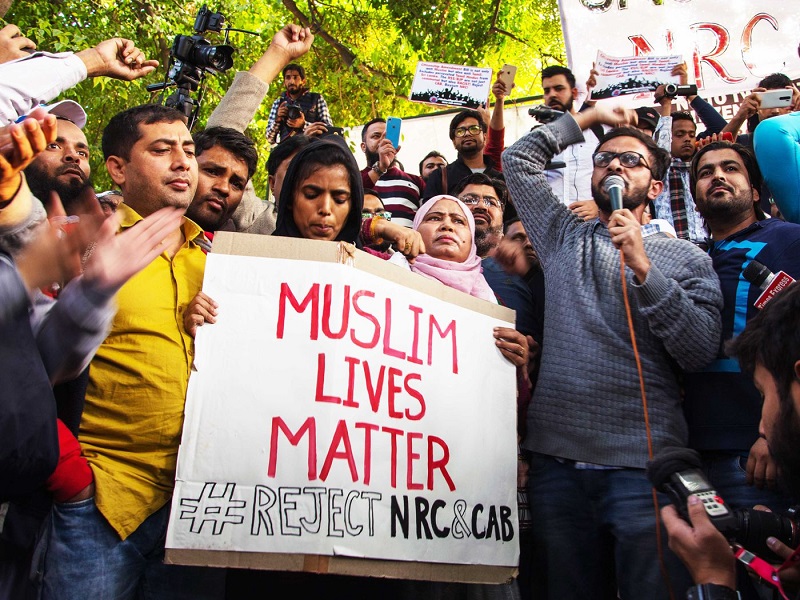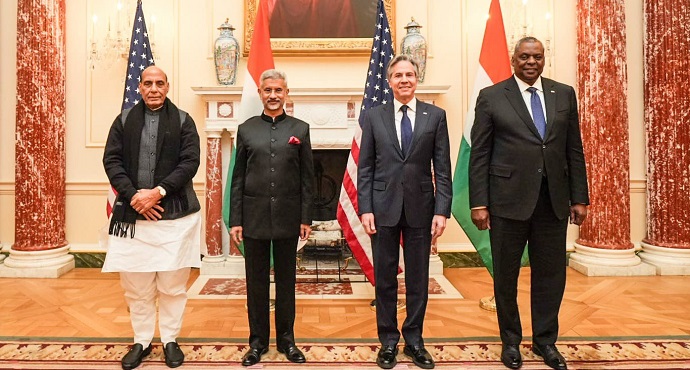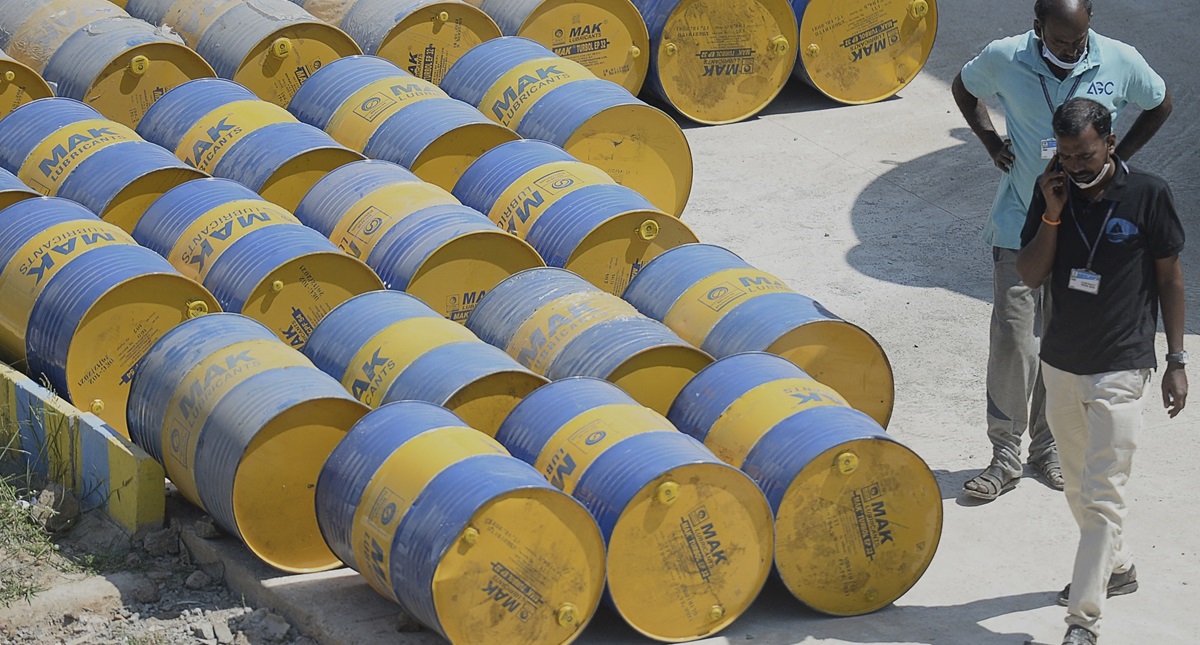U.S. State Department to monitor human rights abuse in India
Syed Bahadur Abbas - May 2, 2022

In a rare and direct criticism against India, the U.S. Secretary of State Antony Blinken stated that his country is keeping a close eye on human rights violations in India.
Blinken’s comments came at a time with a high-level Indian delegation was present in Washington. During a joint press briefing with the U.S. Defense Secretary Lloyd Austin, Indian Foreign Minister Subrahmanyam Jaishankar, and Indian Defense Minister Rajnath Singh, Blinken said that “We regularly engage with our Indian partners on these shared values and, to that end, we are monitoring some recent concerning developments in India including a rise in human rights abuses by some government, police and prison officials.”
In response to the U.S. Secretary of State's comment, Indian External Affairs Minister S. Jaishankar said that India also has concerns about human rights in the United States. Jaishankar said that "people are entitled to have views about us. But we are also equally entitled to have views about their views and about the interests, and the lobbies and the vote banks which drive that. So, whenever there is a discussion, I can tell you that we will not be reticent about speaking out."
Human rights violations in India
Incidents of human rights violations have seen an unprecedented rise during the reign of current Indian Prime Minister Narendra Modi. Many international organizations such as Human Rights Watch and Amnesty International repeatedly raised concerns against violations of human rights, issues related to the freedom of speech, and caste or religion-based discrimination in India. The ruling Bharatiya Janta Party (BJP) has been accused of making certain laws and policies that are in favor of specific caste, sect, or religious group while ignoring the rights of several minorities, which is against India’s self-proclaimed secular democracy model of governance.
 Indian people protest against the Citizenship Amendment Bill — which allows Hindus from South Asian countries to get citizenship and exclude Muslims — in New Delhi on December 7, 2019. (Image Credit: Javed Sultan/Anadolu Agency/Getty Images)
Indian people protest against the Citizenship Amendment Bill — which allows Hindus from South Asian countries to get citizenship and exclude Muslims — in New Delhi on December 7, 2019. (Image Credit: Javed Sultan/Anadolu Agency/Getty Images)
According to a report from the Human Rights Watch, the current Indian government has adopted several laws and policies that have been crafted to systematically discriminate against the Muslim minorities in many regions of the country including the disputed Jammu and Kashmir. The report also states that “Prejudices embedded in the government of the ruling Hindu nationalist Bharatiya Janata Party (BJP) have infiltrated independent institutions, such as the police and the courts, empowering nationalist groups to threaten, harass, and attack religious minorities with impunity.”
The government passed an infamous Citizenship Act in December 2019 that openly discriminates against Muslims, making religion the basis for citizenship. The new Citizenship Act of 2019 demonizes Muslim asylum seekers in India. According to the new amendment, a fast-track system for asylum claims for irregular citizens from the neighboring Muslim-majority countries of Afghanistan, Bangladesh, and Pakistan would be implemented, however, it excludes the Muslims from benefiting from the law.
In a similar incident of government lead discriminatory law, Muslim students in the Karnataka state of India were banned from wearing hijab in the classrooms. Some Hindu nationalists later demanded a similar ban to be imposed all over India. The hijab ban in the Indian state made headlines all around the world and caused many Muslim and non-Muslim leaders from around the world to condemn the Indian government’s actions against its Muslim minority.
Despite an evident rise in the human rights violations in India, the U.S. administration, especially under President Joe Biden, never openly criticize the Indian government’s biased policies toward a section of its population.
India is a critical ally and strategic partner of the U.S. in Asia, especially in the context of the Indo-Pacific region. India holds a key role in the Quad, which is also officially known as the Quadrilateral Security Dialogue, a group of four countries: the United States, Australia, India, and Japan. The Quad has recently intensified its security and economic ties as tensions with China are rising in the Indo-Pacific region. The U.S. State Department’s website states that “The United States and India have shared interests in promoting global security, stability, and economic prosperity through trade, investment, and connectivity.” it further adds that India and the U.S. are “major defense partners” and the two nations have “deepened cooperation on maritime security, interoperability, and information sharing.”
 (L-R) Defense Minister Rajnath Singh, External Affairs Minister S Jaishankar, US Secretary of State Antony Blinken and US Defense Secretary Lloyd Austin. (Image Credit: Twitter/@RajnathSingh)
(L-R) Defense Minister Rajnath Singh, External Affairs Minister S Jaishankar, US Secretary of State Antony Blinken and US Defense Secretary Lloyd Austin. (Image Credit: Twitter/@RajnathSingh)In November 2021, U.S. Secretary of State Antony Blinken named 10 countries that the U.S. government finds to be the worst offenders of religious freedom. The list was prepared by the United States Commission of International Religious Freedom (USCIRF). Despite being listed as a country with the least religious freedom for minorities by many international organizations, India was not on the list of these 10 countries. However, despite being another close ally and defense partner with the U.S., Saudi Arabia’s name was put on the list of offenders.
The Biden Administration is now under pressure from both inside and outside of the U.S. for keeping a blind eye on India’s human rights violations. Blinken’s current remarks about monitoring India’s human rights violations came only days after the debate on the U.S.’s hesitation towards rebuking India’s human rights violations had reached the congress. U.S. Representative Ilhan Omar questioned the reluctance of the Biden administration to criticize the Modi government on human rights issues. She stated that “What does Modi need to do to India’s Muslim population before we will stop considering them a partner in peace?”
Why sudden shift in policy?
Despite being a strong defense partner and strategic ally of the U.S., Russia continues to be India’s largest supplier of defense equipment. Although Russia’s share of India’s defense supply dropped to 49% from 70%, India is focusing on diversification of its portfolio as well as boosting the domestic defense manufacturing industry.
Russia is also supplying India with its S-400 missile defense system, a deal that the U.S. has always discouraged. S-400 missile defense system provides India with the crucial strategic deterrence against China and Pakistan.
Since the Russian invasions of Ukraine started in February 2022, India has been walking on a tight rope of diplomacy as it tries to balance its relations with Moscow and the west. India has repeatedly condemned the war itself and the loss of human lives caused by it, but India’s first statement at the United Nations Security Council (UNSC) did not name any country to be held accountable for the ongoing devastation. The vague diplomatically written statement said that India regrets the ongoing situation and calls for the international community to give diplomacy and dialogue a chance.
Before the UNCS voted on a draft of a UN resolution to condemn the invasion of Ukraine, U.S and Russia issued public appeals for India to take a clear stance. India, however, chose to continue with its policy of keeping a balanced approach to the ongoing situation and abstained from voting on the United Nations General Assembly resolution.
 Workers walk past oil barrels at a filling station in n Chennai on February 24, 2022. (Image Credit: Arun Sankar/AFP)
Workers walk past oil barrels at a filling station in n Chennai on February 24, 2022. (Image Credit: Arun Sankar/AFP)India is taking advantage of the situation by buying cheaper oil from Russia as the Russian oil prices were cut down after western sanctions on Russian oil exports. After U.S. and China, India is the world’s third-largest oil consumer, 80% of India’s oil is imported from outside. Last year India bought only 12 million barrels of Ural oil from Russia, which accounts for only 2% of India’s total oil consumption. Indian oil imports from Russia have seen an unprecedented rise since March 2022, despite the fact that the U.S. and other western countries have put severe economic sanctions on Russia and kept advising all countries to halt economic ties with Russia.
India has justified its oil purchase by referring to the European oil and gas imports from Russia. In a press briefing during their recent visit to Washington for India-U.S. 2+2 dialogue meeting, the Indian Foreign Minister and Indian Defense Minister faced tough questions from the international press. Indian Foreign Minister Jaishankar stated during the press briefing that "I noticed you refer to oil purchases. If you are looking at energy purchases from Russia, I would suggest that your attention should be focused on Europe. We do buy some energy, which is necessary for our energy security. But I suspect looking at the figures, probably our total purchases for the month would be less than what Europe does in an afternoon."
As the war in Europe has entered the third month, it seems that it would take a long time for the western world to normalize its relations with Russia even after the invasion of Ukraine comes to an end. India has managed to put up with both sides so far, but with the increasing tension between U.S. and Russia, India would have to make a choice. Antony Blinken’s recent comments on India's human rights violations are a clear indication that India’s policy of keeping up with both sides is not setting well with the U.S. and its western allies.

















